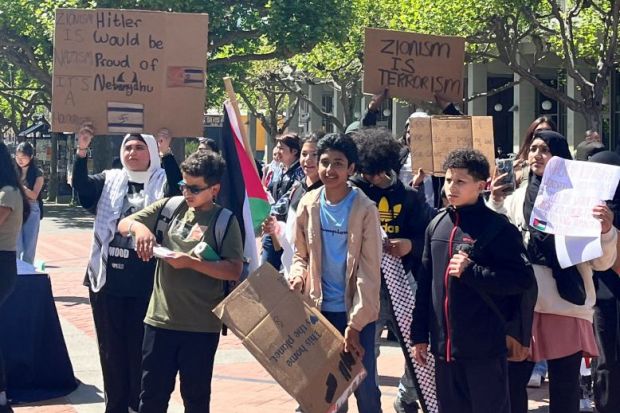Pro-Palestinian protests have flared across the US, with overnight encampments at dozens of campuses leading to hundreds of arrests following incitements by politicians and institutional leaders urging police intervention.
The police actions have included at least 108 arrests at Emerson College, 93 at the University of Southern California, 57 at the University of Texas at Austin, 28 at Emory University, nine at the University of Minnesota, and one at California’s Humboldt State University. Another 33 people were detained in protest actions at Indiana University.
Those followed hundreds of arrests in previous days at Columbia, Brown, New York and Yale universities. Both Columbia and Humboldt cancelled in-person classes in a bid to ease tensions.
US campuses have faced protests and scattered arrests since the October attack by Hamas on Israeli territory. The conflict has led to about 1,200 deaths in Israel and 34,000 in Gaza.
A new wave of student demonstrations broke out last week after Republicans leading the education committee of the US House of Representatives called for the appearance of Columbia’s president, Minouche Shafik, in Washington, where the lawmakers repeatedly demanded that she punish faculty and students who speak up on behalf of the Palestinians.
The nationwide campus confrontations and arrests exploded even further after the speaker of the US House of Representatives, Mike Johnson, came to Columbia this week with several of his Republican colleagues to demand the university president’s resignation and to denounce as antisemitic the students – including many Jews – who have been backing Palestinian rights and protesting against the behaviour of the Israeli government.
The Republican strategy has been widely criticised by Democrats and many of the protesters as a broad attempt to squelch free speech in academia, which Republicans have often characterised as unacceptably liberal in its political orientation.
The sit-in protests at Columbia have now extended to more than a week, despite more than 100 arrests. Both the Republicans and pro-Palestinian activists have called for the Columbia president to resign, because they believe either she has done too little or too much with regard to the demonstrations.
Mr Johnson suggested – with little likelihood of success, at least this year, given Democratic control of the presidency – that the federal government might respond to the nationwide campus protests by cutting off federal aid to institutions that don’t block free student expression or by calling in National Guard troops to halt protests.
At several campuses, however, protest organisers noted that the events had been peaceful and non-disruptive to academic operations until university leaders – pressured by the politicians – called for police intervention. Officials at several universities also complained about non-students joining demonstrations and making conditions more confrontational.
At Emerson College, Boston police began making arrests five days after pro-Palestinian demonstrators built a tent encampment in a city walkway. Similar tent encampments remained up at other area institutions, including Harvard University and the Massachusetts Institute of Technology, both in Cambridge and both on campus grounds.
At USC, most of the arrested protesters were charged with trespassing, a misdemeanour, after they refused orders from officials at the Los Angeles university to take down posters tied to trees in Alumni Park. Some faculty moved classes online, though the university did not issue a blanket order with regard to in-person instruction.
USC – which drew broad condemnation last week when it cancelled the commencement speech of valedictorian Asna Tabassum, citing safety concerns related to her outspoken support for Palestinian rights – has now also cancelled next month’s main university-wide commencement ceremony altogether, blaming the complications of “new safety measures in place” after the demonstrations.
At Austin, the protest was organised by a group calling itself the Palestine Solidarity Committee, which seeks divestment from Israel. University officials said they acted because protest organisers used the rally phrase “Take back our university” and suggested that participants wear masks. “Simply put,” university officials said in explaining their reaction, “the University of Texas at Austin will not allow this campus to be ‘taken’.”
At Indiana University, campus and state police said they detained 33 people who set up tents and canopies in the campus’s Dunn Meadow area and refused repeated requests to remove them. Images posted to social media showed at least one police sniper with a long gun on a building overlooking the area.
At Emory, police began arrests after people from outside the campus community joined an encampment on the Quad, which followed “incidents of vandalism that occurred on multiple buildings” surrounding the area, a university spokesperson said. The event produced a dramatic video of a police officer using a taser on a demonstrator, and Emory’s vice president for public safety, Cheryl Elliott, said that person appeared to be one among several who entered the campus grounds and remained despite repeated requests for them to leave.
At Minnesota, hundreds of students attended demonstrations, several set up an encampment on Northrup Mall and nine were charged with trespassing.
At Humboldt, hundreds of protesters barricaded themselves inside Siemens Hall, an academic and administrative building,
In addition to those at Columbia, arrests earlier in the week involved NYU, where about 120 demonstrators were charged amid protests at Washington Square Park and the nearby Gould Plaza; Yale, where 48 were charged over an occupation of Beinecke Plaza; and Brown, where 41 students were charged after they refused to leave University Hall.
Other sites of extended campus demonstrations across the US – typically carrying demands for their institutions to end financial ties that could benefit the Israeli military, or just aimed at expressing support for Palestinians suffering from Israeli military actions – include the University of California at Berkeley, the University of California at Los Angeles, the University of North Carolina at Chapel Hill, the University of Maryland at College Park, Stanford University, Princeton University, Cornell University, Tufts University, Northeastern University, Northwestern University, Vanderbilt University, Rice University, Swarthmore College, Pennsylvania State University, Washington University in St. Louis, the University of Rochester, the University of Houston, George Washington University, Michigan State University, the University of Pittsburgh and Ohio State University.




